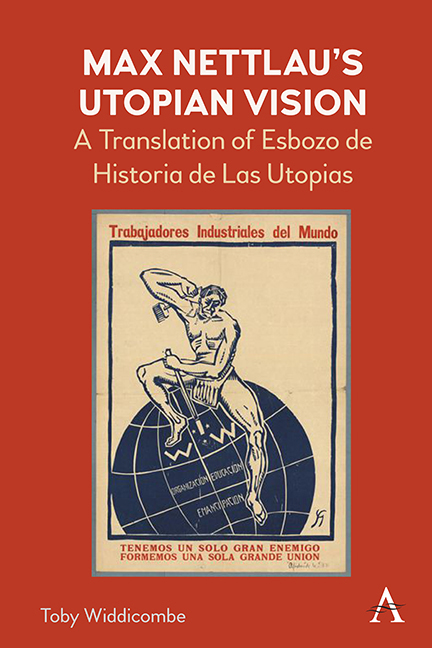Book contents
- Frontmatter
- Dedication
- Contents
- Preface
- Acknowledgments
- Introduction
- Outline of the History of Utopias
- 1 Definition
- 2 The Classical and Medieval Ages
- 3 The Renaissance and Neo-Classical Periods
- 4 The Nineteenth Century (to 1888)
- 5 1888 to the Twentieth Century
- 6 The Twentieth Century: 1900–1925
- Notes
- Appendix A Select Nettlau Bibliography
- Appendix B An Annotated Gazetteer of Nettlau’s Utopians
- Appendix C List of Intentional Communities in Esbozo
- Appendix D List of Utopian Newspapers and Journals in Esbozo
- Bibliography
- Index
5 - 1888 to the Twentieth Century
Published online by Cambridge University Press: 18 November 2023
- Frontmatter
- Dedication
- Contents
- Preface
- Acknowledgments
- Introduction
- Outline of the History of Utopias
- 1 Definition
- 2 The Classical and Medieval Ages
- 3 The Renaissance and Neo-Classical Periods
- 4 The Nineteenth Century (to 1888)
- 5 1888 to the Twentieth Century
- 6 The Twentieth Century: 1900–1925
- Notes
- Appendix A Select Nettlau Bibliography
- Appendix B An Annotated Gazetteer of Nettlau’s Utopians
- Appendix C List of Intentional Communities in Esbozo
- Appendix D List of Utopian Newspapers and Journals in Esbozo
- Bibliography
- Index
Summary
At the beginning of 1888, utopian literature received an abrupt and extraordinary renewal from the publication of the book Looking Backward 2000–1887 by the American writer Edward Bellamy. An edition published in Boston and New York (Riverside Paper Series, September 21, 1889) is called the 220 thousandth. By the beginning of 1890, cheap English reprintings were everywhere: there were four editions at one time. In 1896, a penny edition was produced by Manchester Labour Press; in Germany, the book was published in the most popular and cheap book series at that time, and it has been very widely available ever since then. There have been numerous other translations, and in 1897 there was another book by Bellamy, a sequel, which offers further explanations: Equality. It is a better novel than Looking Backward as far as theory is concerned, but it has neither the verve nor the narrative drive of the earlier work. It did not seize the imagination of the general public as intensely.
However, the immense success of the book by 1889 shows that a well-constructed utopia knows how to reach the public by the hundreds of thousands in a way that theoretical books and pamphlets do not. There are scarcely two or three socialist books that rise above the level of propaganda: There is August Bebel's Die Frau und der Sozialsmus: Die Frau in der Vergangenheit, Gegenwart, und Zukunft [Woman and Socialism: Woman in the Past, Present, and Future] (1891) and Robert Blatchford's Merrie England (1894). I won't undertake to name others, save the contemporary works of Bertrand Russell; but, what has the circulation been of books by Octave Mirbeau, by Anatole France, by Upton Sinclair, by Tolstoy, and so on?! Educational or didactic literature can't do everything; ideas demand to be adorned by art and imagination. The public is not only avid for sensations and rather uninterested in quality, but also curiosity about and desire for a better future have not died out. The public follow those books which have an air of improving the human character. What interest did Camille Flammarion find when, in popularizing astronomy, he cast all of the problems—those concerned with the habitability of the other planets—in a mystical light that excited curiosity?
His book Les mondes imaginaries et les mondes réels. Voyage pittoresque dans le ciel [Imaginary Worlds and Real Worlds.
- Type
- Chapter
- Information
- Max Nettlau's Utopian VisionA Translation of Esbozo de Historia de Las Utopias, pp. 43 - 58Publisher: Anthem PressPrint publication year: 2023



